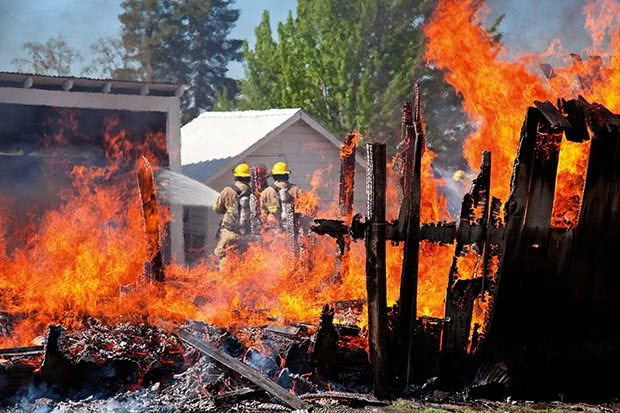25 tips for protecting your farm from fire

When you live on a lifestyle block you face a higher risk from fire than people who live in a town or city. The consequences are greater because fires are detected later and the emergency response takes longer so you need to have a higher level of fire safety awareness and to take extra precautions.
Source: Farm Fire Safe, National Rural Fire Authority, www.nrfa.org.nz
IN YOUR HOME
Most fire deaths occur in the home. Follow these basic fire-safety measures and be fire wise around your home.
1. Install smoke alarms and have identified escape plans. Carry out evacuation drills.
2. Install appropriate fire extinguishers (eg, dry powder) and make sure they’re working.
3. If you’re building a new home or modifying an existing home, consider installing a home sprinkler system.
4. Kitchen fires are the number one cause of fires in the home, so “keep looking while you’re cooking”.
5. Don’t overload extension cords, multi-boxes or power points.
6. Don’t let rubbish and junk accumulate. Clean out roof spaces, basements, cupboards and garages regularly.
7. Keep combustible materials like drying clothes at least one metre from a heater or fire.
8. Clean the chimney at least once a year.
9. Do a fire-safety check at night before you go to bed.
IN THE GARDEN
10. Establish lawns and paths, get rid of flammable vegetation or convert to less-flammable species, and keep your lawn mown and watered.
11. Clear leaves and twigs from gutters and decks.
12. Stack firewood at least 10 metres away from structures.
13. Use approved incinerators and discard ash from home fires into metal containers.
14. Keep a garden hose connected that is long enough to reach around the house.
ON YOUR BLOCK
15. Store petrol, diesel fuels and chemicals in clearly labelled, approved containers and in single-purpose locations away from other farm buildings.
16. Keep areas clear of rubbish, oily rags, firewood and other fuel sources.
17. Fit suitable fire extinguishers in farm buildings and on machinery.
18. Check all machinery has an approved exhaust system and spark arrester, and|
is free of defects that could start a fire.
19. Clean all machinery regularly to ensure belly pans and spaces around motors are free of oil, dust, grease, grass and straw.
20. Get rid of starlings’ nests from around motors and other high-risk areas.
21. Keep trees and branches at least 3 metres clear of power lines.
22. Keep paddocks around farm buildings and yards well grazed to reduce the fire hazard.
23. Bale and stack hay when it’s dry to prevent spontaneous combustion.
24. Do welding and angle grinding only in clear areas.
25. Wet down and have fire equipment handy.
FMG TIP OF THE MONTH
To reduce the risk of fire on your block:
• Always ensure you have obtained the relevant permits before starting a fire.
• Check and recheck that a fire that is supposedly put out has not re-ignited.
• Use smoke alarms in farm buildings and check them regularly.
• Do regular wiring checks on meter boards and electrical wiring in farm buildings.
• Check for birds nesting in vehicles before you start the engine.
• Incorporate cut-out switches in pump sheds and vehicles.
• Ensure you have appropriate fire suppression and public liability insurance, including Forest and Rural Fires Act cover.
• Consider insuring your farm buildings or farm contents with FMG to receive the additional benefit of fire suppression costs*. This means once emergency services have been called, FMG will cover the cost of any reasonable steps taken to initially fight the fire, hiring a helicopter. FMG will cover the cost of a suppression helicopter for the first hour, or up until the Fire Authority takes control of the helicopter within this first hour. FMG will pay up to $5000 for any one event.
*Disclaimer: Please note this is only a summary of the product and is subject to FMG’s specific product documentation. For full details, you should refer to the policy document. You can get these documents, and other information from your local FMG representative, by calling 0800 366 466, or by visiting www.fmg.co.nz
FOR MORE INFORMATION
Contact your nearest New Zealand Fire Service brigade or visit www.fire.org.nz or www.nrfa.org.nz
• For information and advice on installing home sprinklers, visit homesprinklers.fire.org.nz
• For information on lighting fires or undertaking burning, or on fire danger and fire season status, contact your local district council or the closest Department of Conservation office.
• For more technical information on protecting your home and farm buildings from the spread of vegetation or interface fires, get a copy of the National Rural Fire Authority’s manual “FireSmart – Partners in Protection” by contacting the NRFA, phone 04 496-3600.
Love this story? Subscribe now!
 This article first appeared in NZ Lifestyle Block Magazine.
This article first appeared in NZ Lifestyle Block Magazine.
